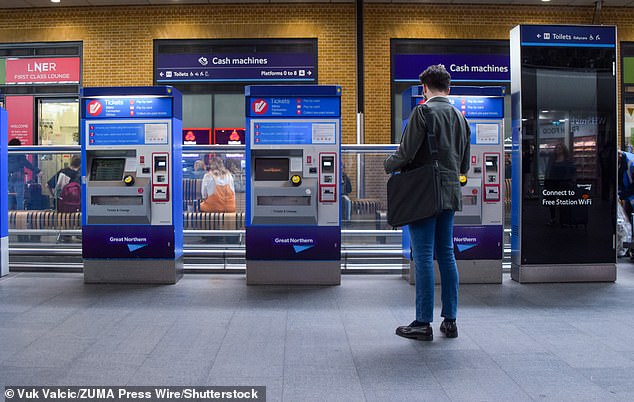Table of Contents
- Train ticket prices are expected to rise next year, according to the July RPI figure plus 1%.
- The exact level of any increase will be decided by the government later this year.
Train fares could rise by as much as 3.2 percent next year, further increasing pressure on long-suffering passengers.
The Government regulates the amount by which railway companies can increase many of their fares.
Typically, train fares rise in March based on the level of retail price index (PPI) inflation in July of the previous year, plus or minus 1 percent.
The Office for National Statistics revealed this week that RPI inflation for July was 2.2 per cent, meaning the Government could allow rail companies to raise fares by up to 3.2 per cent in March 2025.
Cost of travel: Rail passengers face another price hike, with commuters paying the most
This would mean that a season ticket from Reading to London, which now costs £5,600, would rise by £179 to £5,779.
A season ticket from Keighley to Leeds, currently priced at £1,504, would rise by £48.12 to £1,552.12.
An anytime return ticket from Bath Spa to Bristol would increase in price from £11.10 to £11.45.
What is the probability that train fares will increase by 3.2%?
At the moment, we do not know for sure. The government has not confirmed what it plans to do with the level of rail fares by 2025.
The Department of Transportation plans to do so later this year.
But travelers are likely to face a similar price increase, because it is low enough that the government does not see the need to adopt special measures to keep prices lower.
The department took such drastic measures to ensure that rail fare increases would remain lower than normal in 2024.
The RPI level in July 2023 was 9 percent, meaning travelers faced price increases of 10 percent in 2024.
To prevent this, the government has limited price increases for 2024 to 4.9 percent.
In 2023, the government also limited the increase to 5.9 percent, instead of the 12.8 percent increase that would otherwise have been imposed on rail passengers.
Which train fares will increase?
In short, most of them.
But the Government only controls regulated railway rates.
These are:
- Season tickets for most travellers
- Some round-trip tickets out of season
- Travel Cards
- Anytime tickets in large metropolitan areas
Other non-regulated train fares can increase in price at the discretion of the railway company.
These include:
- First class tickets
- Tickets for days outside the high season
- Advance tickets at any time
The Department of Transport has been contacted for comment.
SAVE MONEY, EARN MONEY

Boosting investment

Boosting investment
5.09% cash for Isa investors

Cash Isa at 5.17%

Cash Isa at 5.17%
Includes 0.88% bonus for one year

Free stock offer

Free stock offer
No account fees and free stock trading

4.84% cash Isa

4.84% cash Isa
Flexible ISA now accepting transfers

Transaction fee refund

Transaction fee refund
Get £200 back in trading commissions
Affiliate links: If you purchase a product This is Money may earn a commission. These offers are chosen by our editorial team as we believe they are worth highlighting. This does not affect our editorial independence.


